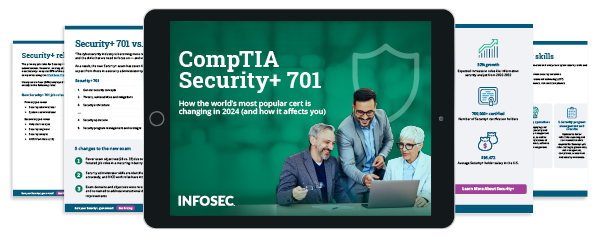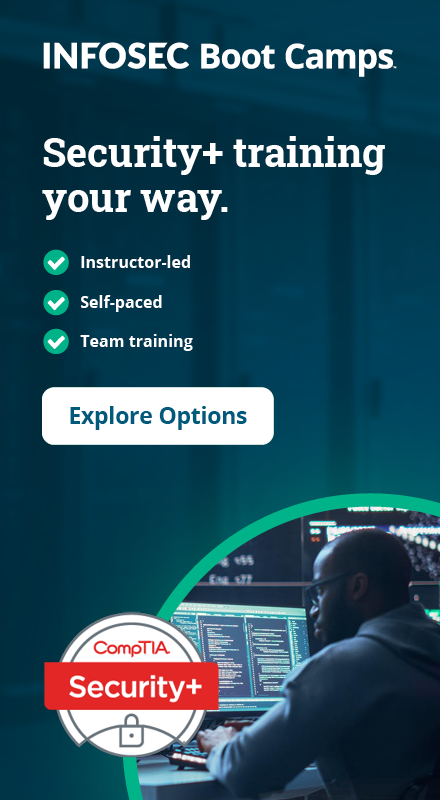Security+ exam: Your complete SY0-701 preparation guide
The CompTIA Security+ certification validates the baseline skills of an individual who performs core security functions. While not mandatory, having this certification is a definite advantage if you want to pursue a career in IT security.
The certification exam focuses on hands-on solutions and performance-based questions that assess your ability to solve various issues. It encompasses the latest trends in risk assessment and management, incident response, forensics, enterprise networks, hybrid/cloud operations, and security controls.
In this article, we'll cover the following Security+ exam details in-depth:
- Reasons to pursue the Security+
- Understanding the Security+ exam
- Preparing for the Security+ exam
- Security+ exam-day tips
- Security+ exam scoring and passing criteria
- The value of Security+ certification
- Security+ exam FAQs and common concerns
For more information on the Security+ exam, get your free Security+ ebook and webinar.

Reasons to pursue your Security+
There are ample reasons to pursue a Security+ certification. It is the most popular cybersecurity certification globally — and one of the most requested, often being the first certification pursued. If you are considering a career in cybersecurity or want to open new opportunities in your current career, consider the following statistics:
- Over 700,000 industry professionals have Security+ certification
- 13% of cybersecurity positions require certification to apply
- 24% of the U.S. cybersecurity workforce is certified
There is a growing demand for certified IT security professionals to meet the needs of the industry. So, what is the Security+ exam, and how can you prepare to ace it?
Understanding the Security+ exam
While the exam has no prerequisites, the CompTIA Security+ certification path was initially designed for IT security professionals with the following skills:
- At least a baseline knowledge of IT security
- Sufficient experience in technical information security
- A broad knowledge of security concerns and implementation, including the topics in the domain list
This is because the CompTIA Security+ certification exam will assess candidates’ knowledge and skills in the following areas:
- Their ability to assess the security posture of an enterprise environment and recommend and implement appropriate security solutions
- Their ability to monitor and secure hybrid environments, including cloud, mobile, and IoT
- The ability to operate with an awareness of applicable laws and policies, including principles of governance, risk, and compliance
- The ability to identify, analyze, and respond to security events and incidents
Security+ exam updates
Around 2000, there was a need for an entry- to intermediate-level certification for professionals pursuing a career in information security. Specifically, there was not a good springboard to intermediate-level security certifications for individuals interested in seriously pursuing a career in information security. CompTIA launched the Security+ certification in 2002 to address this need.
Certification assures employers that their IT security staff qualify and are current in the knowledge and skills needed for their role. It even fulfills the U.S. Department of Defense (DoD) 8570 compliance standards.
Recently, the exam was updated from version 601 to version 701. The update addresses readiness for new and emerging cybersecurity threats, current trends, and techniques. While the initial domains of the exam are preserved in SY0-701, the objectives have become more focused, reflecting the maturation of the industry. Additionally, certain aspects were resigned or reordered to reflect how improved instructional design has affected the way the exam is administered. Watch the following video for more details on the six key changes to the exam:
The changes also reflect that more IT roles in various industries and sectors can benefit from Security+ certification. While the primary job roles addressed are still security administrator and systems administrator, secondary job roles have been expanded to include 18 roles within the NICE Cybersecurity Workforce Framework. The role of Security+ in cybersecurity careers and certifications can be seen from its place as one of the most requested certifications on CyberSeek.
Security+ exam details and format
The domains of the SY0-701 exam were changed compared to 601 (more details on Security+ domains). The current exam format is as follows:
- General Security Concepts (12%).
- Compare and contrast various types of security controls.
- Summarize fundamental security concepts.
- Explain the importance of change management processes and their impact on security.
- Explain the importance of using appropriate cryptographic solutions.
- Threats and Vulnerabilities (22%).
- Compare and contrast common threat actors and motivations.
- Explain common threat vectors and attack surfaces.
- Explain various types of vulnerabilities.
- Given a scenario, analyze indicators of malicious activity.
- Explain the purpose of mitigation techniques used to secure the enterprise.
- Security Architecture (18%).
- Compare and contrast the security implications of different architecture models.
- Given a scenario, apply security principles to secure enterprise infrastructure.
- Compare and contrast concepts and strategies to protect data.
- Explain the importance of resilience and recovery in security architecture.
- Security Operations (28%).
- Given a scenario, apply common security techniques to computing resources.
- Explain the security implications of proper hardware, software, and data asset management.
- Explain various activities associated with vulnerability management.
- Explain security alerting and monitoring concepts and tools.
- Given a scenario, modify enterprise capabilities to enhance security.
- Given a scenario, implement and maintain identity and access management.
- Explain the importance of automation and orchestration related to secure operations.
- Explain appropriate incident response activities.
- Given a scenario, use data sources to support an investigation.
- Security Program Management and Oversight (20%).
- Summarize elements of effective security governance.
- Explain elements of the risk management process.
- Explain the processes associated with third-party risk assessment and management.
- Summarize elements of effective security compliance.
- Explain the types and purposes of audits and assessments.
- Given a scenario, implement security awareness practices.
The exam includes a maximum of 90 questions in various formats, including multiple-choice, drag-and-drop and performance-based scenarios. The duration of the exam is 90 minutes, allowing an average of one minute per question. The passing score is 750 out of 900 or higher.
Watch the video below for a few Security+ sample questions, or read our article to learn more on Security+ performance-based questions.
Preparing for the Security+ exam
If you feel you lack certain skills for the exam or just feel you need a refresher with regard to any of the key topics and domains listed above, you can pursue various strategies for preparing to sit the exam. There are several ways to prepare for your Security+ exam:
- Self-taught. Free material is available online for those who prefer to prepare alone, including webinars, ebooks and training videos.
- On-demand courses. On-demand learning, for example, using the Security+ training resources available from companies like Infosec, is an option for some who simply want a refresher or those bound by time restraints, financial limitations or other factors.
- Boot camp. Boot camps like Infosec’s CompTIA Security+ Training Boot Camp provide more than just training. This option includes an Exam Pass Guarantee, an exam voucher, and hands-on exercises led by cybersecurity experts that will teach you everything you need to know.
Tommy Gober, Infosec’s lead instructor for the Security+ Boot Camp, shares his top piece of advice for exam preparation— “learn the terminology.” Understanding the language of the exam is key to comprehending the objectives of the exercises. He recommends downloading the list of exam objectives and checking off terms as you verify you understand them. This “honest personal assessment” is critical to establishing readiness. Watch the following video for more preparation tips:
No matter which option you choose, these Security+ exam tips can help:
- Determine a study structure by acquainting yourself with the exam outline and CompTIA Security+ exam objectives
- Work step-by-step to comprehend core concepts with methods like hands-on practice rather than forcing rote memorization
- Regularly revisit materials to reinforce memory retention, returning to each domain until you have a solid grasp
- Integrate regular breaks into your study sessions to maintain focus and productivity and prevent burnout
Security+ exam-day tips
On exam day, prep early to minimize stress and allow time for unexpected tech or other issues.
During the exam, expect performance-based, simulated environments that test your ability to solve problems. While tackling questions or instructions, read each item meticulously and rely on your practice pace to manage your time. If necessary, use the option to flag questions for review.
Use these Security+ exam tips to clear your mind and stay focused during the exam:
- Be aware of time. During the exam, you may reach a high concentration level, often referred to as “the zone.” This greater focus is good for problem-solving but can make you lose track of time. What may seem like seconds can be minutes passing quickly, so make sure you stay focused and aware.
- Take your time. Even with limited time, don’t force yourself to rush. Pay attention to each question and answer option and ensure you fully understand it. Words such as MOST, LEAST, NOT, ALL, NEVER and ALWAYS can subtly affect meaning. Watch for distractors (obviously false options) in multiple-choice questions and quickly eliminate them.
- Try to relax. Remember to stretch, relax your muscles and breathe mindfully during the exam. A relaxed mind can help you solve difficult questions.
- Don’t panic. Remaining calm will improve your concentration. If you followed your study plan, your results will likely be great. If you don’t pass, you have more experience for the next try!
Security+ exam scoring and passing criteria
Candidates will be evaluated on a maximum of 90 questions with a scoring method that factors in the question's complexity. The resulting score will be anywhere from 100-900, with 750 being the passing score. Those who fail to achieve a score of at least 750 can retake the exam, and there is no limit on how many times. Although you can retake the exam immediately if you fail your first attempt, you must wait 14 days between subsequent attempts.
The key is to prepare thoroughly. Infosec’s CompTIA Security+ Training Boot Camp includes an Exam Pass Guarantee, so if you don’t pass on the first attempt, you’ll get a second try at no cost.
The value of Security+ certification
Is the Security+ worth it? Yes, as mentioned above, a rising number of employers are requiring job applicants to have the certification. In addition, the certification assures your prospective employers that you have the skills needed to bolster their security posture and manage threats even under pressure, making it a positive addition to your resume. By refocusing the objectives of each domain and including security threats and trends affecting more industry sectors, the update from SY0-601 to 701 demonstrates that certification is impacting an increasing number of industries and sectors, opening countless job opportunities.
Consider the case of a member of the National Guard. A superior officer helped him prepare for his certification because he was interested in a career in IT. His certification rapidly led to a job as a defense contractor after he took a boot camp via the VetsinTech (VIT) program.
Be ready for the SY0-701 exam
All the information you need to make sure you're ready to ace your Security+ exam in one free ebook.
Security+ exam FAQs and common concerns
Can the Security+ exam be taken at home?
Yes, they have online proctoring. Besides testing from home, you can also take the exam in a closed-door office or any place that has a private area available to you. Technical support is provided in case something goes wrong during your online exam session.
What are the exam registration process and fees?
Registration starts with creating an account on the Pearson Vue website. Once you are registered, you can schedule your exam. A CompTIA Security+ exam voucher pricing is priced at $404, but you can always find the most up-to-date pricing on CompTIA’s site. Keep in mind, however, that if you sign up for a training boot camp such as Infosec’s Security+ Boot Camp, the cost of the exam voucher is included.
What happens if I fail the exam?
Those who fail to achieve a score of at least 750 can retake the exam, and there is no limit as to how many times. Although you can retake the exam immediately if your first attempt fails, you must wait 14 days between subsequent attempts. Infosec’s Security+ Boot Camp includes an Exam Pass Guarantee, so if you don’t pass on the first attempt, you’ll get a second try at no cost.
How do I renew my Security+ certification?
Security+ certification is valid for three years and must be renewed before it expires. A program called Continuing Education (CE) allows you to earn renewal by completing a certain number of CE units, or CEUs. You can complete these activities one at a time or as multiple activities. Those who hold multiple certifications only need to renew the highest-level certification.
Where can I get more Security+ resources?
A number of online resources are available for those who would like to train themselves or pursue self-paced education. For example, Infosec offers a free ebook. Additionally, you can register to watch their CompTIA webinar or visit their YouTube channel.
How do I sign up for Security+ training?
The best way is to go through an authorized training partner, such as Infosec. This will give you access to free resources or more comprehensive boot camp training. Visit Infosec for more information.





